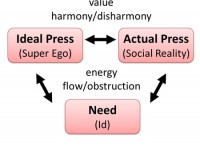In CDF, a person’s psychological profile is determined by evaluating answers to Morris Aderman’s Need/Press Questionnaire, a construct-validated questionnaire used in talent management, performance management, and promotion since 1970. The questionnaire is available on line in English, German, French, and Spanish (www.needpress.com). Questionnaire outcomes ideally complement social-emotional insight deriving from semi-structured interviews. The questionnaire embodies Henry Murray’s personality theory which is based on the notion of psychogenic (inborn) needs and associated pressures as defining a individual’s personality.
In NP, clients’ profile is viewed in terms of three foci: self concept, approach to tasks, and interpersonal perspective (emotional intelligence.). Discussing these behavioural clusters in class tremendously helps students distinguish between what is “social-emotional” (developmental) and “psychological” in their own and in clients’ behavior and way of working with others.
Students learn to make fine behavioral distinctions and observations; they also learn how to give appropriate and complex feedback to clients, weaving psychological insights into feedback on clients’ present social-emotional frame of reference.
In CDF, a person’s psychological profile is viewed as the “glue” that holds his/her competences together, and also as a filter through which adult developmental resources pass on their way to inform the use of competences.
In this course, students learn in depth how to explore the self conduct, approach to tasks, and interpersonal perspective of adults, based on Morris Aderrman’s Need/Press Questionnaire (NP), found online at www.needpress.com. The questionnaire embodies Henry Murray’s personality theory which is based on the notion of psychogenic (inborn) needs and associated pressures as defining a individual’s personality. The psychological profile focused on by the questionnaire, newly validated in 2014, has to do with fundamental differences between adult personalities, and with threats to well-being in individuals shown to engage with fulfilling extreme inborn needs.
